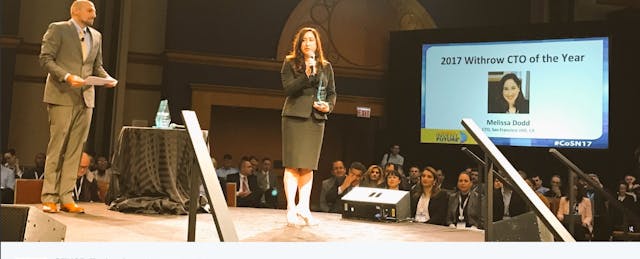Amidst a sea of suits, Melissa Dodd, Chief Technology Officer of San Francisco Unified School District, became the second woman named as the top CTO of the year by CoSN, the Consortium for School Networking. "Equity is at the center of what we do," she said.
Dodd wasn't alone. At its annual conference, held this year in Chicago, CoSN also awarded its Seymour Papert lifetime achievement award to Cheryl Scott Williams, currently ISTE's acting chief executive. In addition, CoSN named the districts of Meriden, Conn. and Socorro, Texas as exceptional district teams, working to improve student learning, opportunities and access.
Most provocative was Tom Wheeler, former chairman of the Federal Communications Commission, who CoSN lauded for his public service. Wheeler shared his pride in helping oversee the changes the FCC made in managing E-rate, the program that funds internet connectivity to schools. "Remember your ABCs: Access benefits children," Wheeler said. And he shared his fears about the current FCC's directions, particularly the impact of moving to a per-pupil reimbursement policy.
"I have four questions to ask the current leadership," Wheeler said. "And just do the math." Here's what Wheeler proposed the current FCC ask:
1. What will be the impact of per-pupil reimbursement on rural schools? Urban areas typically have four times as many students as their rural counterparts.
2. How will per-pupil reimbursement affect fiber installation? About 3,700 U.S. schools still lack adequate bandwidth, Wheeler pointed out, and need fiber.
3. How will the administration continue to incentivize states to step up and support connectivity? Forty-two state governors have made connecting schools a priority. States have provided $200 million in matching funds to support the work. But if the federal government scales back, will states continue to step up?
4. What kind of fiscal deficit will the FCC's new policy create, especially for rural schools? "Rural schools need more support—not less—because of the increasing capital costs of providing their students with equal opportunities."
"Those running the FCC are those who voted against the reforms," Wheeler pointed out. "I hope they'll do their math," he added. (In other venues, Wheeler has also sharply critiqued the current FCC for undoing net neutrality provisions.)
This year marks CoSN's 25th anniversary. Keith Krueger, the chief executive of the professional association, said that the group is shifting from a pure focus on technology to putting more spotlight on the learner. "Tech is the environment we're working in," he said, but the people matter deeply.
CoSN is also in the midst of releasing more resources for administrators and educators: In addition to certifying administrators who pass a tough test about the usage of tech in schools, it also now offers a consulting service, its Peer Review Program where other school leaders will visit a school and offer feedback on technology implementations and other questions. CoSN also continues to build out handbooks on topics including cybersecurity, data privacy and gives a glimpse of the future via its Horizons Report.


